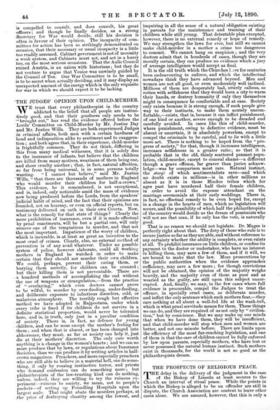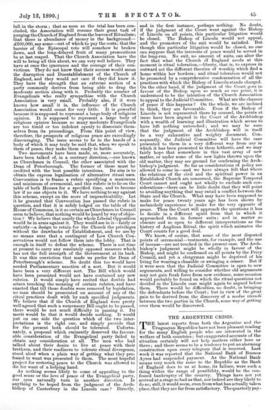THE PROSPECTS OF RELIGIOUS PEACE.
THE delay in the delivery of the judgment in the case of the Bishop of Lincoln at least secures to the Church an interval of ritual peace. While the points in which the Bishop is alleged to be an offender are still in dispute, the Church Association are content to leave other cases alone. We are assured, however, that this is only a lull in the storm ; that as soon as the trial has been con- cluded., the Association will resume their great task of purging the Church of England from the leaven of Ritualism; that there is abundance of money in the background.— £100,000, say some—out of which to pay the costs; that the barrier of the Episcopal veto will somehow be broken down, and the long-delayed fruit of many prosecutions be at last reaped. That the Church Association have the will to bring all this about, we can very well believe. They have at once the ignorance and the courage of their con- victions. They do not know that their success would mean the disruption and. Disestablishment of the Church of England, and they would not care if they did know it. They have the strength that an extreme section of a party commonly derives from being able to drag the moderate section along with it. Probably the number of Evangelicals who really sympathise with the Church Association is very small. Probably also, if it were known how small it is, the influence of the Church Association would count for very little. It is powerful because it is supposed. to represent a large body of religious opinion. It is supposed. to represent a large body of religious opinion because so many moderate Evangelicals are too timid or too indolent openly to dissociate them- selves from its proceedings. From this point of view, therefore, the prospects of religious peace are exceedingly discouraging. The issue seems to be in the hands of a body of which it may truly be said that, when we speak to them of peace, they make them ready to battle.
Two movements have been made, or, more accurately, have been talked of, in a contrary direction,—one known as Churchmen in Council, the other associated with the Dean of Peterborough. The former of these must be credited. with the best possible intentions. Its aim is to obtain the express legalisation of alternative ritual uses. Convocation is to frame a rubric specifying a maximum and minimum of ceremonial, and this rubric is to lie on the table of both Houses for a specified. time, and to become law if no one objects to it. We have nothing to say against this scheme, except on the score of impracticability. Let it be granted that Convocation has passed the rubric in question, and that it is safely lodged on the table of the House of Commons, is it so certain as Churchmen in Council seem to believe, that nothing would be heard. by way of objec- tion? We believe that nearly the whole Liberal Opposition would be in arms against it. They would. see in it—fairly or unfairly—a design to retain for the Church the privileges without the drawbacks of Establishment, and. we are by no means sure that a contingent of Low Church Con- servatives would not follow them into the lobby. That is enough in itself to defeat the scheme. There is not time at present to carry any resolutely opposed measure which has not the full strength of the Government at its back. It was this conviction that made us prefer the Dean of Peterborough's scheme. No doubt this too would have needed Parliamentary sanction of a sort. But it would have been a very different sort. The Bill which would have been presented would not have contained any new rubrics. It would simply have recited that doubts had arisen touching the meaning of certain rubrics, and have enacted. that till these doubts were removed by legislation, no man should be prosecuted on account of any of the ritual practices dealt with by such specified judgments. We believe that if the Church of England were pretty well agreed that such a suspensory Bill ought to be passed, there would be not much difficulty in passing it. Its merit would be that it would decide nothing. It would put on one side the question which of the two inter- pretations is the right one, and simply provide that for the present both should be tolerated. Unfortu- nately, a proposal which eminently deserved the favour- able consideration of the Evangelical party failed to obtain any consideration at all. The men who had talked about their desire to live at peace with their brethren, and their readiness to tolerate ritual divergence, stood aloof when a plain way of getting what they pro- fessed to want was presented to them. The most hopeful project for restoring peace to the Church was allowed to the for want of a helping hand. As nothing seems likely to come of appealing to the good sense or the love of peace of the Evangelical party, our eyes naturally tarn in another direction. Is anything to be hoped from the judgment of the Arch- and in the first instance, perhaps nothing. No doubt, if the judgment of the Court went against the Bishop- of Lincoln on all points, this particular litigation would. be closed. The Bishop of Lincoln would not appeal, and. the promoters of the suit would be satisfied. But. though this particular litigation would be closed, no one can suppose that the interests of peace would be served in the long-run. No suit, no amount of suits, can alter the- fact that what the Church a England needs at this. moment is ritual toleration,—liberty, that is, to express in outward act the different theories of worship which find a. home within her borders ; and ritual toleration would. not be promoted by a comprehensive condemnation of all the- practices with which the Bishop of Lincoln stands charged. On the other hand, if the judgment of the Court goes in, favour of the Bishop upon so much as one point, it is understood to be the intention of the Church Association.
to appeal to the Judicial Committee. What are the chances of peace if this happens ? On the whole, we are inclined to think, they are favourable. Even if the Bishop of Lincoln is not represented there by counsel, the points at. issue have been argued in the Court of the Archbishop. with a wealth of learning and illustration which seems to. have left nothing untouched ; and we may be sure that the judgment of the Archbishop will in itself be a very exhaustive and weighty document. Con- sequently, the Judicial Committee will have the case presented to them in a very different way from any in which it has been presented to them hitherto, and we may fairly hope that somewhere in this vast array of new matter, or under some of the new lights thrown upon the old matter, they may see ground for confirming the Arch- bishop's judgment. So far as considerations of policy are allowed to come in—and we have always felt that where the relations of the civil and the spiritual power in an Established Church are concerned, the Supreme Temporal Court cannot and ought not wholly to exclude such con- siderations—there can be little doubt that they will point to avoiding anything that may entail a conflict between the State and the Church. What may have been supposed to- make for peace twenty years ago has been shown by melancholy experience to make for the very opposite of peace. Thus the Court will approach the questions it has ta decide in a different spirit from that in which it approached them in former suits ; and in matter so. obscure and so open to different interpretations as the history of Anglican Ritual, the spirit which animates the Court counts for a good deal. We know, of course, that some of the most disputed points of ceremonial—vestments, for example, and the use- of incense—are not touched in the present case. The Arch- bishop's judgment might be wholly in favour of the Bishop, and might be confirmed on all points by the Privy- Council, and yet a clergyman might be deprived of his living for wearing a chasuble or swinging a censer. But if it were seen that the Judicial Committee is open to new. arguments, and willing to consider whether old arguments. may not gain fresh force from new evidence, some occasion would probably be found on which the ritual questions not decided in the Lincoln case might again be argued before them. There would be difficulties, no doubt, in bringing the defendants before the Court ; but in view of the great gain to be derived from the discovery of a modus uivendi between the two parties in the Church, some way of getting over them would be discovered.



































 Previous page
Previous page